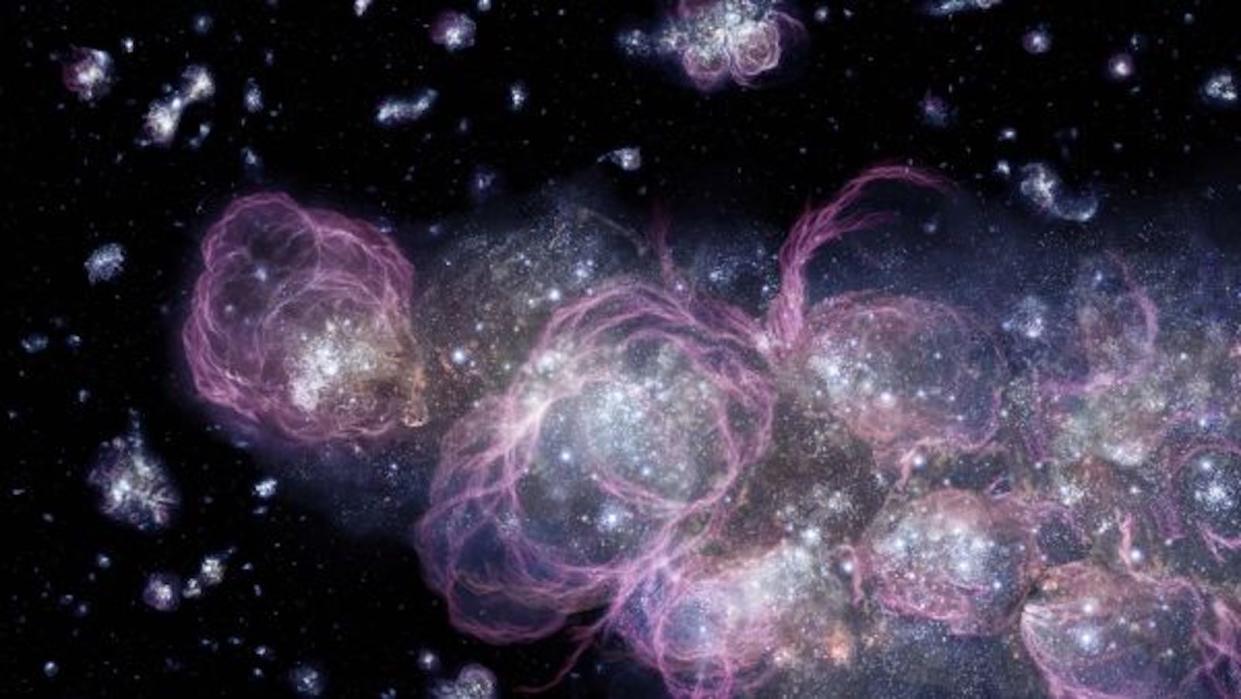Why didn't the infant universe collapse into a black hole?

You may have wondered: Why didn't the universe collapse into a black hole during the earliest moments of the Big Bang? Simply put, because that's not how you make a black hole.
If you want to make a black hole yourself, it's relatively straightforward: You just take any object and squeeze it as hard as possible. If you can resist all of the other forces and squeeze any amount of matter below a certain critical threshold, then gravity will take over and do the rest of the work for you, crunching that matter down into an infinitely small point and creating a black hole.
That threshold, known as the Schwarzschild radius, depends on the amount of matter you want to squeeze. If you were to take a human body and squeeze it down to the size of roughly an atomic nucleus, you would end up with a human-mass black hole the width of an atomic nucleus. If you were to repeat the process with our planet, you would end up with an Earth-mass but bean-sized black hole.
Related: What happens at the center of a black hole?
Nature makes black holes all the time through the deaths of massive stars. When they run out of fuel, their own gravitational attraction pulls as much material as possible into as small a volume as possible, eventually overwhelming any other force of nature and creating black holes a few miles across with the mass of a few suns.
So that's the simple, one-step trick to making black holes: You take a lot of matter and squeeze it to incredibly high densities.
The early universe
But the centers of massive stars are not the only locales in the universe that have reached incredibly high densities. About 13.77 billion years ago, our entire visible universe was crammed into a volume no bigger than a peach with a temperature of over a quadrillion degrees. That's a rather high density.
So why didn't the entire universe collapse into a black hole? There are two reasons.
One, the creation of a black hole relies on not only incredibly high densities but also density differences. To make a black hole, you need a lot of material crammed into a very small volume, with nothing else surrounding it. Gravity works only on differences. If the density is the same from place to place, then there are no gravitational differences and thus no chance to trigger the formation of a black hole.
Yes, the early universe was incredibly dense. But it was dense everywhere, with barely any differences. Without those differences, black holes couldn't form, because there was no difference in gravity that could lead to the sudden collapse of matter.
RELATED STORIES:
— Could the universe collapse into a singularity? New study explains how.
— Are there any black holes left over from the Big Bang?
— Tiny primordial black holes could have created their own Big Bang
A dynamic universe
But even without density differences, what about the entire universe recollapsing into the singularity that birthed the Big Bang itself? Just to be clear, that wouldn't make the universe turn into a black hole. A black hole is an ultradense collection of matter within space. When we're talking about the expansion or contraction of the universe, we're talking about the evolution of space itself.
But even if it wasn't a black hole, what prevented the collapse into a singularity? What prevented it is that the early universe wasn't static — it was dynamic. It was evolving. It was changing. And most importantly, it was expanding.
The rules of black hole formation simply don't apply in an expanding universe. It's no longer like a star sitting in the middle of empty space, imploding on itself. To collapse into a singularity, it's not enough to have a ton of mass sitting around. You need an overwhelming amount of mass to counteract the natural expansion of the universe and force it to collapse.
And there simply wasn't enough mass in the universe to do that — back then and even now. For decades, cosmologists wondered if there might be enough matter in the universe to cause the present-day expansion to slow down, stop and reverse, eventually leading to a "big crunch" and a return to a singularity.
But multiple measurements have confirmed that there isn't enough stuff to get the job done. Our universe will, as far as we can tell, continue expanding well into the future. Which is a good thing for us — life as we know it doesn't tend to do well inside black holes.

